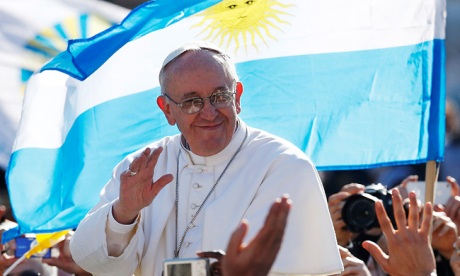Pope Francis has ordered the Vatican to open its files on Argentina’s military dictatorship from 1976 to 1983.
The Pope’s order came after a meeting he had last week with Lita Boitano, 83, whose two sons “disappeared” during the dictatorship.
They were among the 20,000 people who were made to “disappear” by the Argentinian authorities, who saw them as subversives.
The Vatican collected a large amount of information on these cases, principally through the papal nuncio’s office in Buenos Aires.
Mrs Boitano is president of the Argentinian human rights group Familiares
Pope Francis has asked the Vatican’s secretariat of state to take charge of opening the files.
Work has already begun on declassifying these archives.
Opening the archives could eventually help the families of thousands of victims of the military regime finally discover the fate of their loved ones.
The possibility of the Vatican issuing a statement of self-criticism regarding its role during Argentina’s dictatorship was discussed at a meeting between Mrs Boitano, the Pope and a Vatican official, Mrs Boitano said.
The most important documents to be released could be the reports wired to Rome by the Vatican’s then ambassador to Buenos Aires, Msgr Pio Laghi, who met regularly with the military chiefs.
Msgr Laghi even played tennis on a regular basis with the navy’s then commander-in-chief, Admiral Emilio Massera, considered to have been one of the bloodiest members of the military junta.
The Vatican also collected information from victims’ families, who turned to Msgr Laghi for help.
The nuncio’s office kept files on the thousands of disappearances reported by relatives and pleaded to the military for clemency, often acting as a go-between in specific cases.
Italian media reported a Vatican official saying that the relevant archives could be opened in a year, after they are scanned and digitised.
Mrs Boitano pleaded for an immediate opening of the archives as many of the parents of the “disappeared” are elderly and cannot wait.
Pope Francis was Archbishop of Buenos Aires before being elected Pope in 2013.
Sources
- The Guardian
- Image: MPR News
